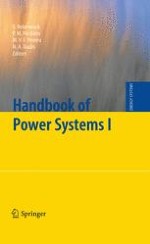2010 | OriginalPaper | Buchkapitel
Integrated Electricity–Gas Operations Planning in Long-term Hydroscheduling Based on Stochastic Models
verfasst von : B. Bezerra, L. A. Barroso, R. Kelman, B. Flach, M. L. Latorre, N. Campodonico, M. Pereira
Erschienen in: Handbook of Power Systems I
Verlag: Springer Berlin Heidelberg
Aktivieren Sie unsere intelligente Suche, um passende Fachinhalte oder Patente zu finden.
Wählen Sie Textabschnitte aus um mit Künstlicher Intelligenz passenden Patente zu finden. powered by
Markieren Sie Textabschnitte, um KI-gestützt weitere passende Inhalte zu finden. powered by
The integration of natural gas and electricity sectors has increased sharply in the last decade as a consequence of combined cycle natural gas thermal power plants. In some countries such as Brazil, gas-fired generation has been a major factor in the overall growth of natural gas consumption. When related to the operations planning, in some hydrothermal systems, a national system operator dispatches these gas-fired plants (along with other thermal sources such as coal, oil, and nuclear) in conjunction with the country’s hydroelectric plants by using a production-costing model based on stochastic programming. The algorithm determines the optimal hydro-to-thermal energy production ratio on the basis of the expected benefit of reducing thermal plant generation over a large number of hydrological scenarios, along a planning horizon of some years. This means that the optimal scheduling decision today depends on the assumptions about future load growth and future entrance of new generation capacity. Stochastic dynamic programming models are extensively used. However, the hydrothermal scheduling models usually do not take into account the possibility of future fuel supply constraints, either in production or in transportation. The assumption of fuel supply adequacy is felt to be reasonable for the more mature markets such as coal and oil. However, because of the fast growth of the natural gas market, it is possible that demand outpaces supply or transportation investments. Indications that gas-related constraints could be relevant were observed in New England, in the US, and in Brazil in 2004, where several megawatt of combined-cycle generation could not be dispatched when needed due to constraints in pipeline capacity. The objective of this work is to present a methodology for representing the natural gas supply, demand, and transportation network in the stochastic hydrothermal power scheduling model. Application of the integrated electricity–gas scheduling model is illustrated in case studies, with realistic configurations of the 90GW Brazilian system.
